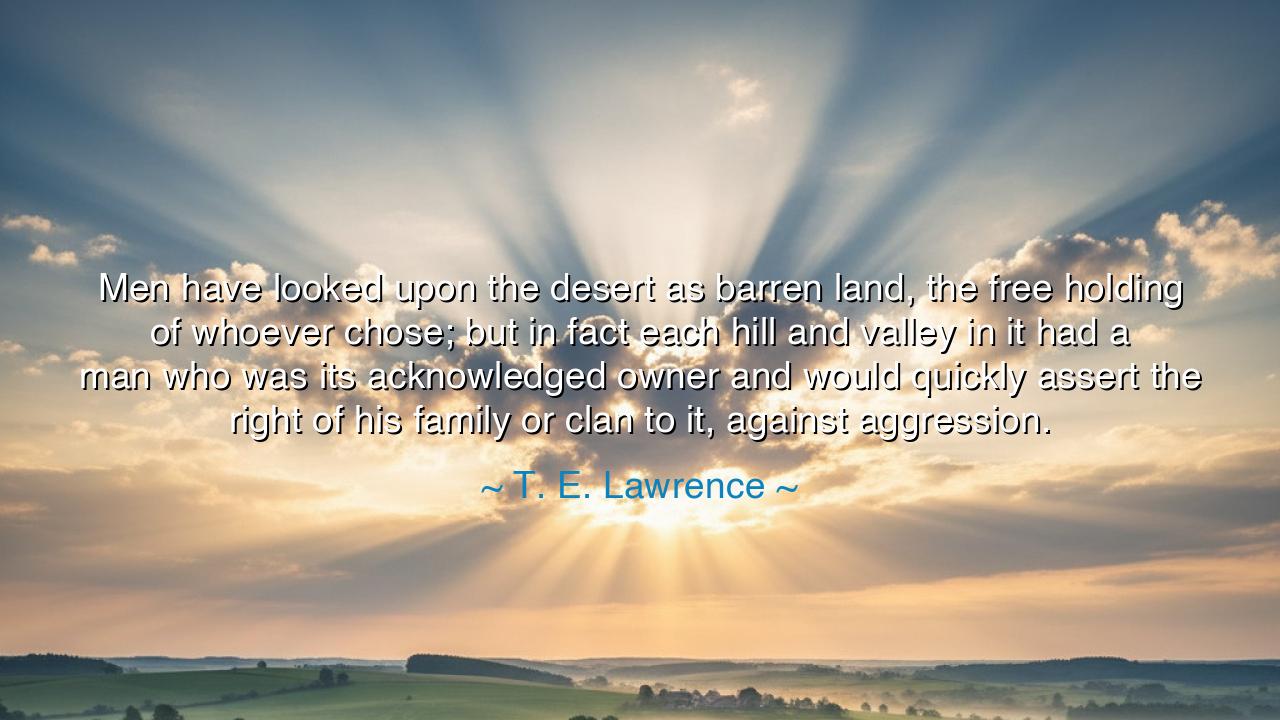
Men have looked upon the desert as barren land, the free holding
Men have looked upon the desert as barren land, the free holding of whoever chose; but in fact each hill and valley in it had a man who was its acknowledged owner and would quickly assert the right of his family or clan to it, against aggression.






The gentle hum of the café filled the air, blending with the steady rhythm of rain against the window. Jack sat across from Jeeny, his coffee cup cradled in his hands, his gaze fixed on the rain-soaked streets. Jeeny, sitting opposite him, seemed lost in thought, her fingers tracing the rim of her cup.
Host: After a brief pause, Jeeny spoke, her voice reflective, but with a hint of curiosity.
Jeeny: “I came across a quote from T. E. Lawrence today that made me think about land, ownership, and how people shape their connection to the places they live. He said, ‘Men have looked upon the desert as barren land, the free holding of whoever chose; but in fact each hill and valley in it had a man who was its acknowledged owner and would quickly assert the right of his family or clan to it, against aggression.’ What do you think he means by that? Do you think the concept of ownership is different depending on the place or culture?”
Jack: He looked up, considering her words. “I think Lawrence is pointing to the fact that land isn’t just empty space—it’s deeply personal and tied to people’s identities. In places like the desert, where many might assume there’s nothing to claim, ownership is still very much defined by who has lived there, who has historical ties to it, and who has the right to protect it. Land isn’t just land; it carries meaning, history, and family. Even in the barren, it’s not about how much you can cultivate, but about how you belong to it and the story that ties you to it.”
Jeeny: “Yes, and I think it’s also about resilience. In harsh environments like the desert, where survival is tough, ownership isn’t just a legal concept—it’s about a sense of belonging and protection. For the people who live there, the land isn’t just something they claim; it’s a part of them. The connection runs so deep that they’re willing to defend it fiercely, not just for resources but because it represents their identity and their place in the world. There’s a personal connection to the land that transcends the idea of ownership we might be familiar with in more settled societies.”
Host: The rain outside had softened, leaving a quiet stillness between them. Jack shifted slightly, his fingers still resting on his coffee cup as he continued.
Jack: “That’s true. In many ways, Lawrence is reminding us that ownership isn’t a simple, transactional thing—it’s cultural and deeply tied to identity. People don’t just stake claim to land because it’s valuable in a material sense; they do it because it’s theirs in a more fundamental way. It’s where their ancestors lived, where their stories unfold, and where their families have roots. So, when you challenge that, you’re not just challenging land—you’re challenging who they are and their connection to everything they’ve built over time.”
Jeeny: “Exactly. And I think this idea of ownership ties into broader cultural understandings of land and belonging. In some places, ownership is defined by family, history, or kinship—not by paper or legal documents. In societies like that, to claim someone’s land is to claim their heritage and their very sense of self. There’s a reason the defense of land is so fierce—it’s not just about property; it’s about legacy.”
Host: The conversation seemed to deepen, as they both reflected on the complexity of ownership. Jack set his coffee cup down gently, his expression softening.
Jack: “I think what Lawrence is highlighting is the difference between the way we often view land—as something to be controlled or used—and the way others see it—as something that is woven into their very identity. When land becomes more than just a piece of property, it becomes a part of the people’s soul. So when someone challenges that ownership, it’s not just a territorial dispute—it’s an attack on everything that ties the people to that place.”
Jeeny: Her smile was small but filled with understanding. “Exactly. Ownership, in its deepest sense, is about more than possession—it’s about connection. It’s about belonging. And when we recognize that, we see that land isn’t just a resource—it’s the foundation for understanding who we are and where we come from.”
Host: The rain had stopped, leaving a calm stillness in the café. Inside, Jack and Jeeny sat in the realization that ownership of land is often more than just a legal concept—it’s a deeply personal connection to history, identity, and family. T. E. Lawrence’s words remind us that land isn’t just something to be claimed—it’s something to be protected, valued, and understood as a vital part of who we are and where we come from. Ownership is not just about material possession; it’s about belonging.






AAdministratorAdministrator
Welcome, honored guests. Please leave a comment, we will respond soon